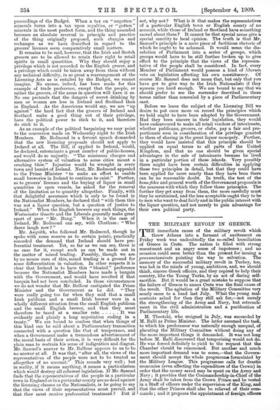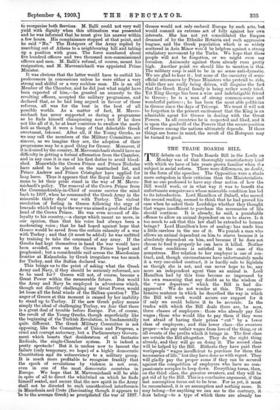THE MILITARY REVOLT IN GREECE.
TM immediate cause of the military revolt which J. threw Athens into a ferment of excitement on Friday week was undoubtedly the so-called humiliation of Greece in Crete. The nation is filled with strong resentment and an angry sense of impotence ; and no occasion could seem better than the present for issuing a pronunciarniento pointing the way to salvation. The memory of the successful military revolt in Turkey, too, was hot in the minds of young, ambitious and, we should think, sincere Greek officers, and they aspired to help their country, like the Young Turks, by an act of daring self- sacrifice. But it would be a great mistake to suppose that the failure of Greece to annex Crete was the final cause of the revolt. The agitation of the Military Committee very nearly came to a head last July. What the young mal- contents asked for then they still ask for,—not merely the strengthening of the Army and Navy, but retrench- ment in the civil administration and a purification of Parliamentary life.
M. Theotold, who resigned in July, was succeeded by M. Ralli as Prime Minister. The latter assumed the task, to which his predecessor was naturally enough unequal, of placating the Military Committee without doing any of the more important things it demanded. It was not long before M R,alli discovered that temporising would not do. He was forced definitely to yield to the request that the Chamber should be summoned. But another and much more important demand was to come,—that the Govern- ment should accept the whole programme formulated by the Military League. This programme calls for drastic economies (even affecting the expenditure of the Crown) in order that the money saved may be spent on the Army and Navy ; it provides that the Commandership-in-Chief of the Army shall be taken from the Crown Prince and be vested in a Staff of officers under the supervision of the King, and that the other Princes shall also be relieved of their cora- ',ands ; and it proposes the appointment of foreign. officers to reoi.ganise both Services. M. Rani could not very well yield with dignity when this ultimatum was presented and he was informed that he must give his answer Within a few hours. Iris complaisance stopped at that point, and he said "No." The Hotipurs of the Army replied by Marching out of Athens to a neighbouring hill and. taking Up a position with guns. The force numbered about five hundred officers and two thousand non-commissicined Officers and men. M Ralli's refusal, of "course, meant his resignation, and M. Mavromichaeli was appointed Prime Minister.
It was obvious that the latter would have to outbid his predecessors in concessions unless he were either a very strong and skilful or a very reckless man. He is an old Member of the Chamber, and he did just what might have been expected of him,—he granted an amnesty to the revolting officers, accepted the military programme, and declared that, as he had long argued in favour of these reforms, all was for the best in the best of all possible worlds. As a matter of fact, M. .Mavro- michaeli has never supported so daring a programme as he finds himself championing now ; but if he does not like all of it, he at least contrives to swallow the nasty leek as though it were a lump of that delectable Greek sweetmeat, lalcoumi. After all, if the Young Greeks, as we may call the members of the Military Committee, are sincere, as we imagine they are, the adoption of their iiroeramme may be a good thing for Greece. Moreover, if it is desired by the country, M. Mavromichaeli should have no difficulty in getting a formal affirmation from the Chamber, and in any case it is one of his first, 'duties to avoid blood- shed. Meanwhile the Crown Prince and. Prince Nicholas have asked to be placed on the unattached list, and Prince Andrew and Prince Cristopher have applied for Tong leave. Thus it appears that the Royal family do not mean to let their pride stand in the way of M. Mavro- niichaeli's policy. The removal of the Crown Prince from the Commandership-in-Chief of course carries the mind hack to 1897, when he commanded the Greek Army in the Miserable thirty days' war with Turkey. The violent revolution of feeling in Greece following the orgy of bravado which led up to the war was aimed a good deal at the head of the Crown Prince. He was even accused of dis- loyalty to his country,—a charge which meant no more, in our opinion, than that his voice had always been a moderating voice ; that he had hoped against hope that Greece would be saved from the certain calamity of a war with Turkey ; and that (it must be added) he was unfitted by training to take the command of any army. If .the Greeks had kept themselves in hand the war would have been avoided, even as the Crown Prince hoped and • ophesied; but a considerable raid across the Macedonian frontier at Kalambaka by Greek irregulars was too much for Turkey, and the Sultan declared war. : This brings us to the point of asking what the Greek Army and Navy, if they should be seriously reformed, are to be used- for ? Greece will not, of course, become a Great Power within the measurable future. But would the Army and Navy be employed in adventures which, though not directly challenging any, Great Power, would' let loose all the fatal winds of the Balkan question ? The anger of Greece at this Moment is caused by her' nability to stand up to-Turkey. -If the new Greek policy means simply the ideal of challenging Turkey, we .fear that there is a great deal of trouble before Europe. For, of course, the revolt of the Young Greeks, though superficially like the beginning Of the Turkish Revolution, is funda,Mentlilly quite different. The Greek Military Committee is not opposing, like the Committee of Union and Progress, a cruel' and corrupt autocracy, but a Parliamentary Govern- ment which boasts that desideratum of all fantastic Radicals, the single-Chamber system. it is indeed a pretty spectacle ! But it_ is useless now to lament the failure (only temporary, we hope) of a highly democratic Constitution and its subserviency to a military group. It is much more profitable to recognise frankly that the epoch of revolutions by violence, is not over,' even in one of the most democratic countries in Europa. We hope that M. Mavromichaeli will be able in spite of all to direct the whirlwind on which he finds himself seated, and secure that the new spirit in the Army Shall not be directed to such unauthorised interference in Macedonia and Crete (fascinating though it appears to le to the average Greek) as precipitated the war of 1897. Groom would . not, only embroil Europe by such acts, but would commit an extreme .act of folly' against her 'own interests. She has not yet consolidated the Empire, dreamed of by the Etbnike Hetairia and such aggressive' leagues, and the Greek population' which is so widely scattered in'Asia Minor wou'.d be helpless against a. strong retaliatory movement by the Turks. We hope that these people will not be forgotten, or we might even say forsaken. Animosity against them already runs pretty high. Another point we should like to mention is this. The military coup is said to be in no' sense anti-dynastic. We are glad to hear it ; but none of the casuistry of semi- official utterances by Prime Ministers who pretend to ride, while they are really being driven,' will disguise the fact that the Greek Royal family is being rather sorely tried. Yet King George has been a wise and indefatigable friend to Greece ; he is a man of strong common-sense and wonderful patience; he has been the most able politician in Greece since the days of Tricoupi. We trust it will not be forgotten in the present excitement that the King is an admirable agent for Greece in dealing with the Great Powers. In all countries he is respected and. liked, and it is upon the goodwill of the Powers that the secure position of Greece among the nations ultimately depends. If these things are borne in mind, the revolt of the Hotspurs may be turned to good.







































 Previous page
Previous page